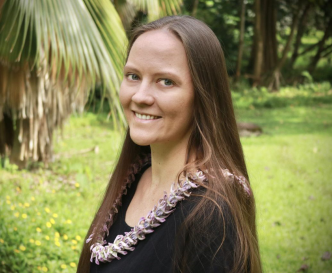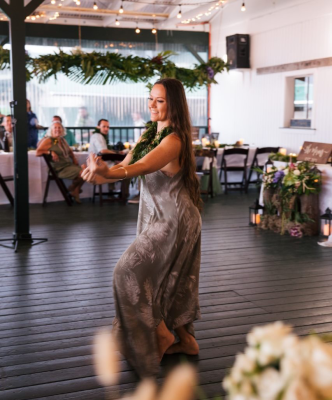 Wainani Traub, a Staff Anthropologist out of our Honolulu, Hawaiʻi office and co-lead of the Native & Indigenous People of SWCA Employee Resource Group (ERG).
Wainani Traub, a Staff Anthropologist out of our Honolulu, Hawaiʻi office and co-lead of the Native & Indigenous People of SWCA Employee Resource Group (ERG).Meet Wainani Traub, Assistant Project Anthropologist out of SWCA’s Honolulu office and co-lead of the Indigenous People of SWCA Employee Resource Group. Wainani shares a glimpse into her story, passions for her heritage, hula, and anthropology, and goals for leading the group.
Q: Thanks for joining today! Can you start by talking a bit about yourself and your career?
A: A very traditional Hawaiian introduction would be to recite your genealogy as far back as you can, in the form of a song or chant. Another form of Hawaiian introduction, adopted from our Polynesian cousins, is to say the mountain and water source where you are from. For this wider SWCA audience, I’ll just say my name is Wainani Traub, I am from Kona, Hawaiʻi island, the leeward side of the island (beautiful beaches and sunsets). I now live on Oʻahu island in Kāneʻohe, on the windward side, about a half hour outside of Honolulu (beautiful mountain ranges).
In 2018 I received my bachelor’s degree in Pacific History from the University of Hawaiʻi at Hilo with subject certificates in Pacific Island Studies and Public History. I am almost finished with my master’s degree in Historic Preservation from the University of Oregon. I’ve worked for SWCA for a little over a year doing various cultural and archaeological projects that involve ethnographic research and conducting oral history interviews. I am one of two employees at SWCA with ‘Anthropologist’ in my title. I really admire my supervisor and the people I work with, and I love being a part of this group that gets jobs done.

Q: What are your interests outside of work?
A: Hula is much more than a hobby to me; it is a lifestyle. Many people’s lives are completely dedicated to it. I was very actively involved with my hālau (school of hula) for most of my life with practices and competitions, and I really miss it. I’ve competed in the Merrie Monarch Hula Festival (people equate it to the super bowl of hula). I also enjoy lei making, which goes hand in with hula, reading, hiking, snorkeling, and just being around the ocean.
Q: What are the accomplishments, priorities, and goals for the Indigenous People of SWCA ERG?
A: The goals of the ERG are as follows:
- Increase visibility and recognition of Native and Indigenous people at SWCA
- Influence the culture of SWCA to be more inclusive and supportive
- Build networks and make connections to advance our careers
- Nurture new friendships
- Promote thoughtful discussion between members and allies
- Raise awareness of the concerns, values, and issues that affect Native and Indigenous people
Q: How and why did you become a lead for the ERG?
A: I was super appreciative when Victoria Boyne started the ERG. This was within a few months of when I started working at SWCA and I was unfamiliar with employee resource groups and the company in general. I have gained so much from being a part of the group and it was so helpful in orienting me to how things are done at SWCA and how we can be collaborative.
Q: What does your heritage mean to you?
A: It’s everything. It’s my entire life’s purpose. I was among the first generations of Native Hawaiian children to attend a Hawaiian language immersion school. I grew up during a time when Hawaiian language revitalization efforts were in their infancy. So much of culture is encapsulated in language; you cannot have a culture without a language. From the onset of my education in the immersion program, I understood that the Hawaiian culture and language came terrifyingly close to extinction, and that grim fate may befall us (Native Hawaiians) if our cultural revitalization mechanisms are not strengthened and sustained. I was engrained with a sense of responsibility for the survival of our culture. There is a concept in the Hawaiian language called kuleana, which most closely translates to a moral responsibility to enrich one’s community. I’ve positioned myself in the field of cultural resources and heritage management because my work allows me to fulfill my kuleana to my community, and this gives me a deep sense of purpose in my life.
Q: What would you like people to know about Native and Indigenous people?
A: Having a strong sense of one’s own heritage gives purpose, meaning, and direction to life. The Hawaiian language, culture, and hula are so beautiful and empowering. I feel the most alive when I dance hula. In regard to histories of colonization, education, and awareness come with responsibility. It is not enough to merely educate yourself on the past injustices done to Native and Indigenous people. The question is how you will put action to that awareness and knowledge.
Q: How can individuals better support and be allies to Native and Indigenous people and their causes?
A: At the end of the day, being a good ally is just being a good person. It is about being open to receiving feedback and then rather than being defensive, internalizing it, becoming educated, and then making that change.
There are several issues where environmental issues intersect with Indigenous rights. As experts in our fields, we can use our expertise to support Native and Indigenous peoples. Additionally, you can support Native and Indigenous businesses.